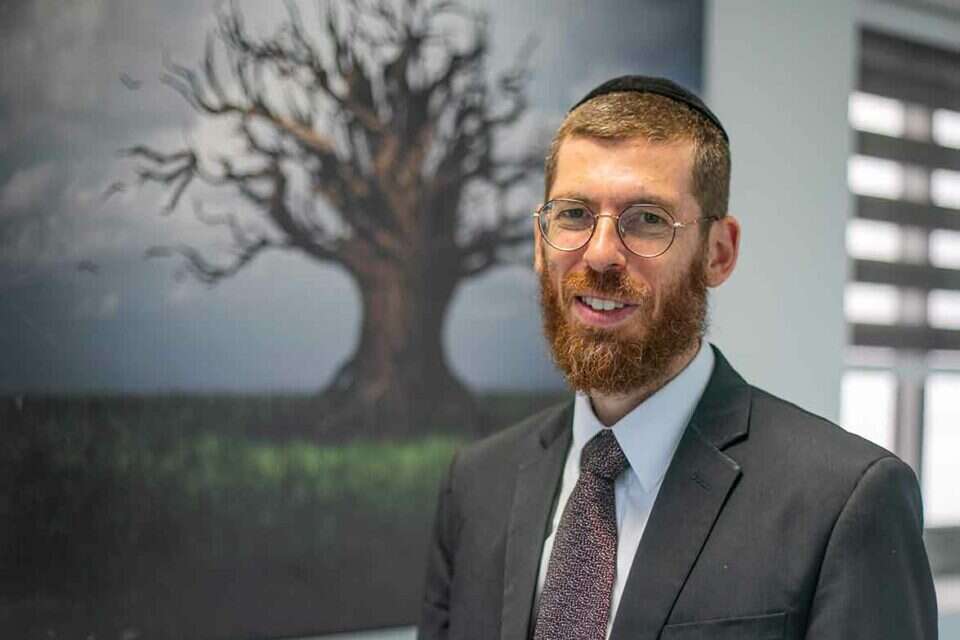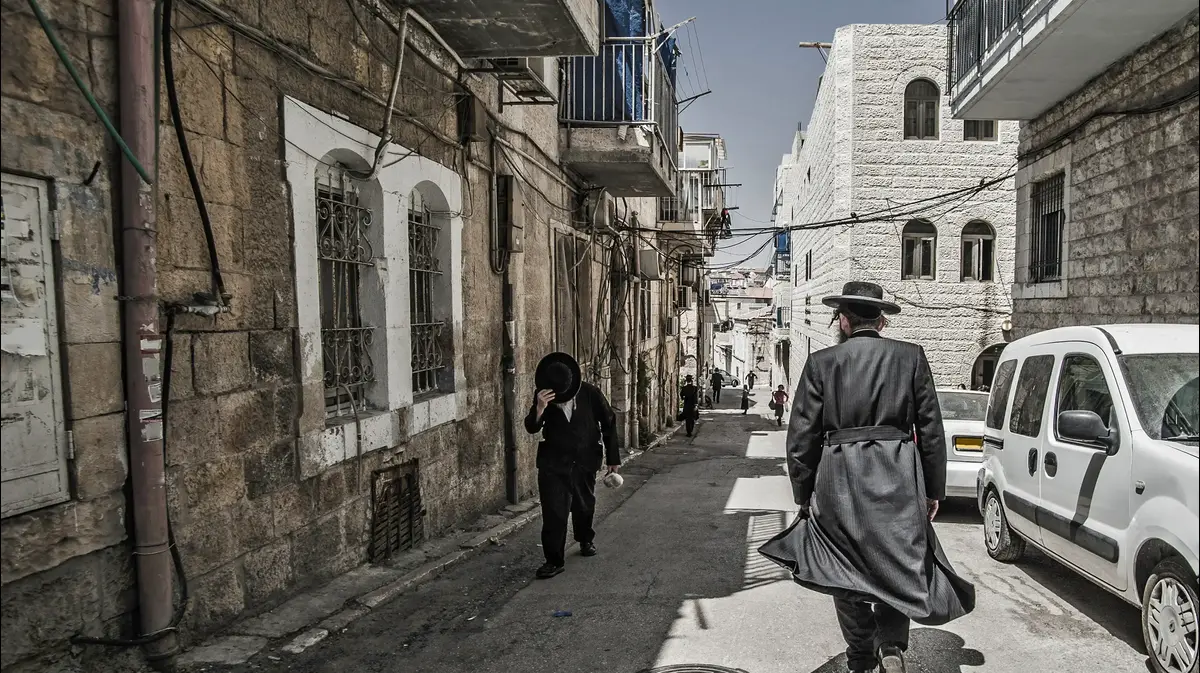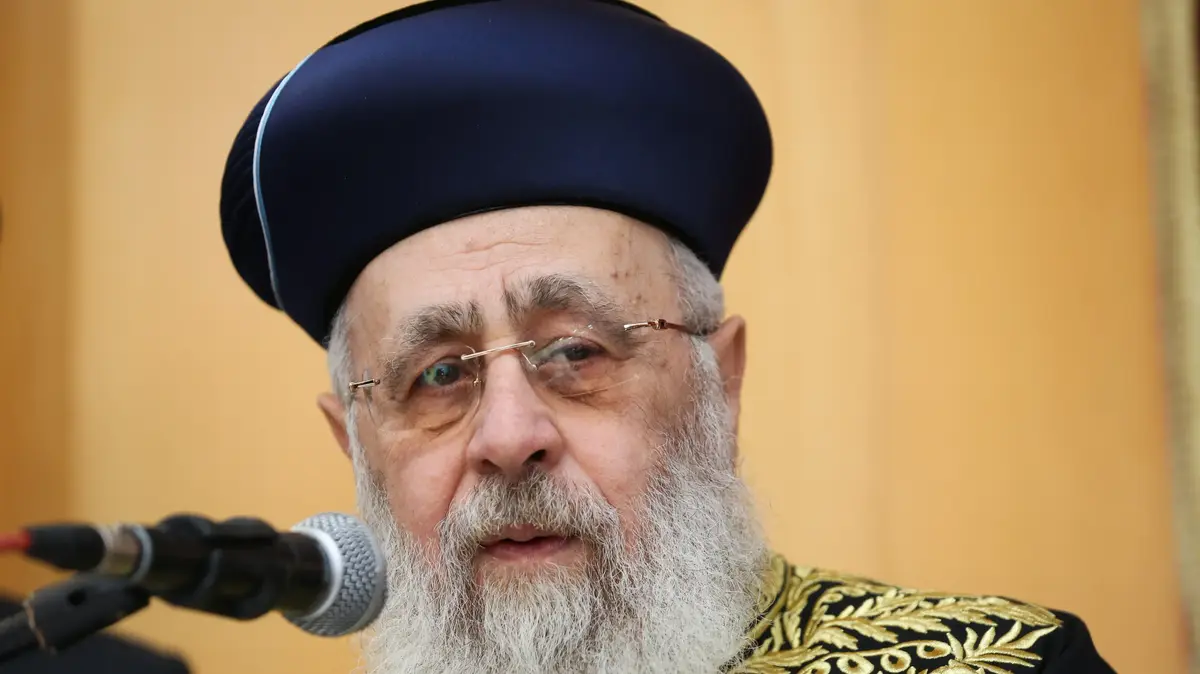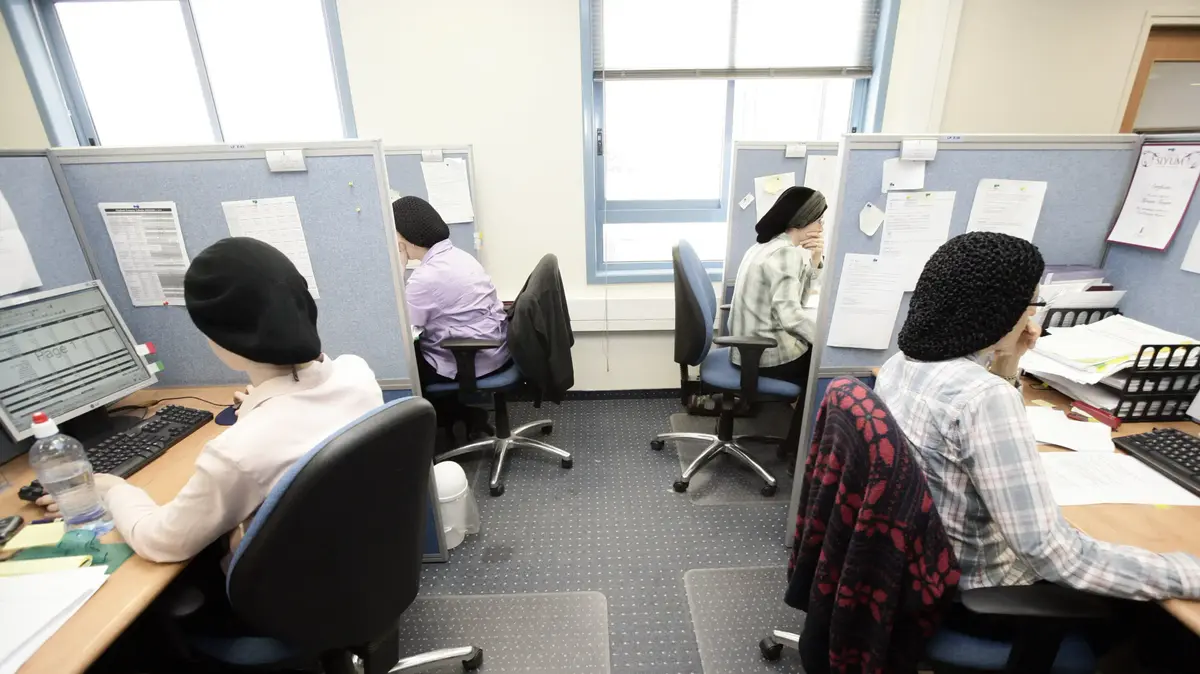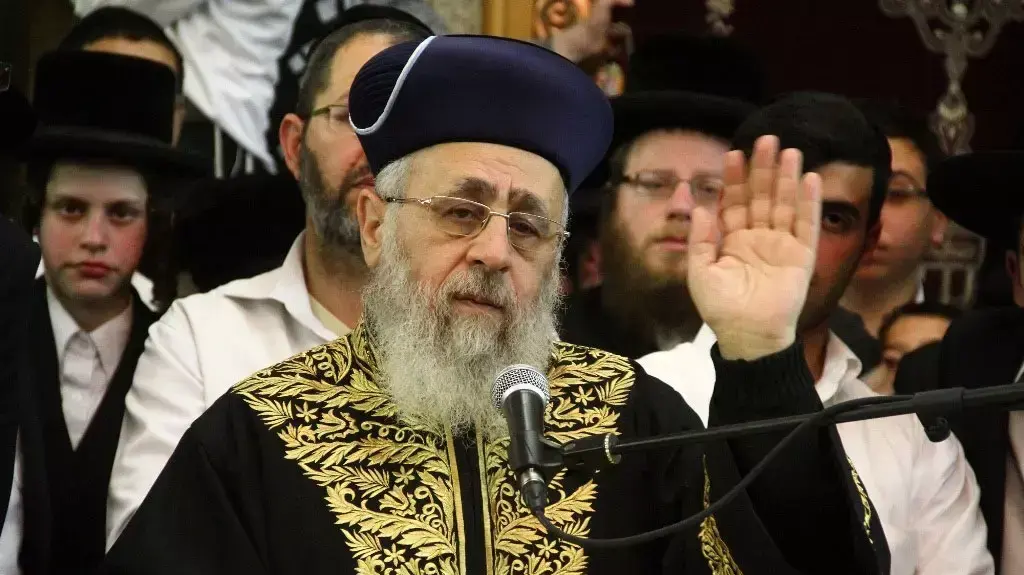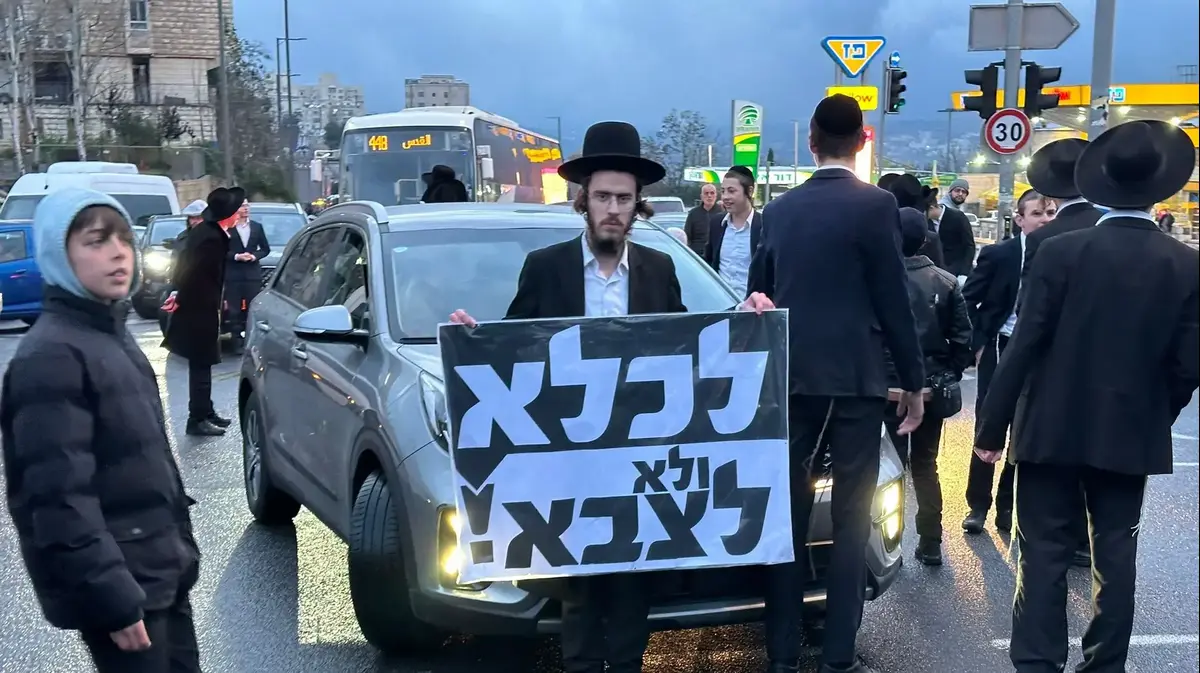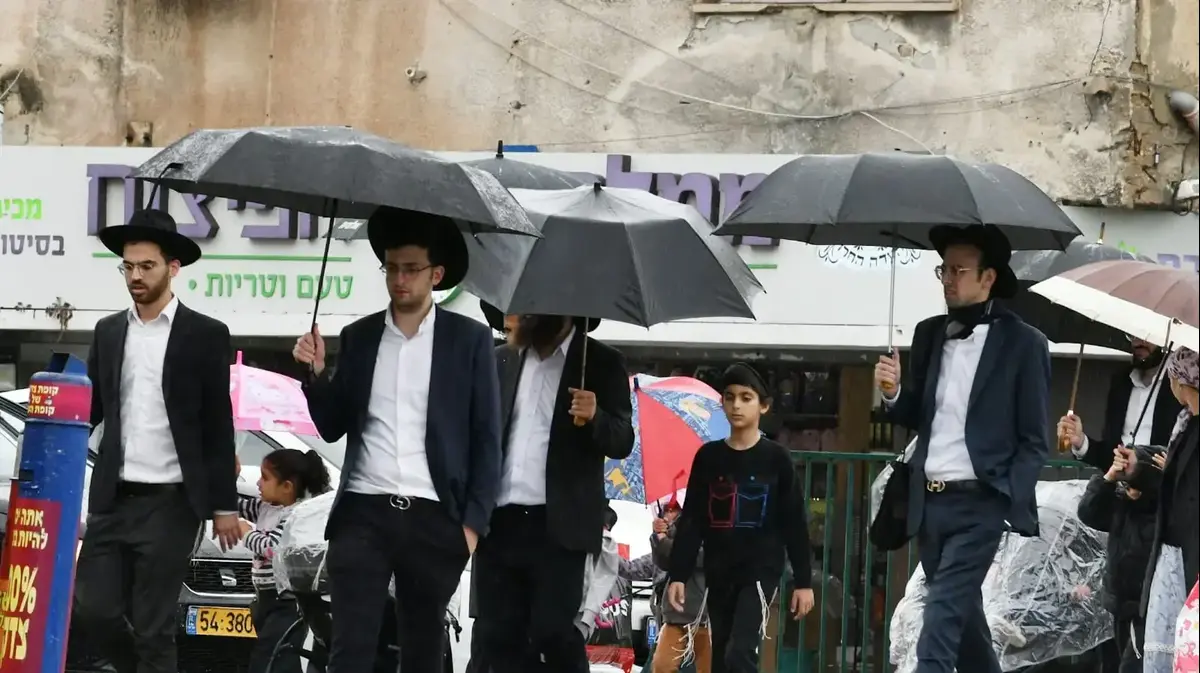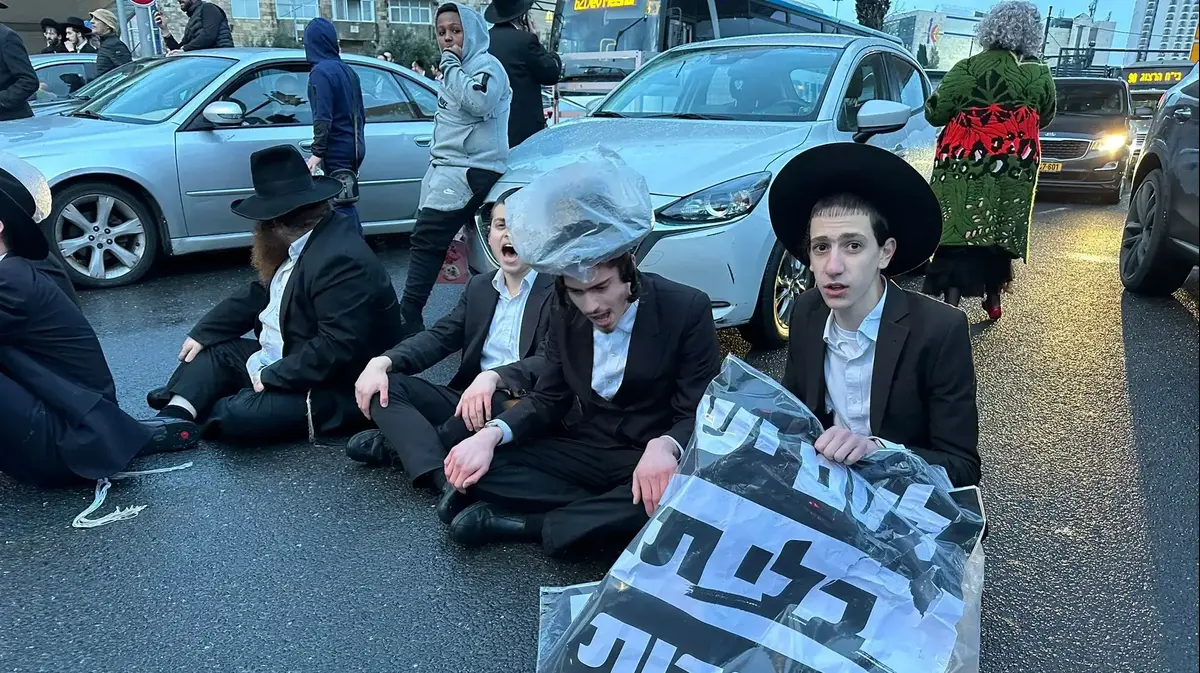"There is a kind of horror literature in Israel - what will happen when the ultra-Orthodox are in the majority. The fear is that all the seculars will be sent to seminars on getting closer to Judaism, and many social activities are prohibited." With these words, Rabbi Yehoshua Pepper, community rabbi, jurist and editor of the journal "Needs Eyon", describes the thoughts that accompany the character of ultra-Orthodox society.
According to birth statistics, in a few decades the ultra-orthodox will make up about a third of the country's population and will become the largest sector.
Sociologists and demographers deal with this question quite a bit, but Rabbi Pepper provides a view from the heart of ultra-Orthodox-Lithuanian society and unfolds a complex and sober social view.
"The situation today is that even the ultra-Orthodox themselves are afraid of what will happen when they are in the majority, because there is no vision and no one knows what will happen. We are not prepared for it at all. It is impossible to run a country like Stibel. When Minister Yaakov Litzman was once asked what he would do when there was an ultra-Orthodox mandate majority , replied 'We will never be a majority.' The interviewer asked, 'What will happen if you do?'
Welitzman came back and replied: 'We will never be.'
"When another politician was asked this, he replied: 'We will call the US president and ask to be the 51st country.'
They are right: we cannot be a majority in our situation today, because we do not have a regular or even a non-regular form of state management.
The whole idea of ultra-Orthodox society is that of a minority community, and it is a comfortable place that allows maximum differentiation but also imposes minimal influence.
This was the division of labor between Ben-Gurion and the Chazon Ish in building the state: Ben-Gurion deals with the state, and the Chazon Ish in the Torah and Yeshiva world.
This division has been preserved to this day, but it has no feasibility.
That's why not only the secular are afraid, but also the ultra-Orthodox."
"Orderly thinking and a variety of topics - this is the good news."
The home page of "needs reference",
Rabbi Pepper stands on the border between ultra-Orthodox society and Israeli society as a whole.
He is deeply rooted in the ultra-orthodox world and his outlook, but with his own activity and outlook he manages to bring about a bridge between the different worlds.
As the editor of the ultra-Orthodox magazine from Keren Tikva "Needing a study", he looks inward into the intricacies of ultra-Orthodox society with a deep look of identification and love and is able to see both what is missing, the points that still require work, refinement or change, and also the "dead zones", which have not yet been invested in thinking and reference.
There is almost no sensitive point in ultra-Orthodox society that he does not work in: army, academia, law, education and thought, economy and politics - in all of them he succeeds in breaking a new-old path, not only with new thinking but also with extensive action.
We meet in his office at the Keren Tikva offices, not long after his wife underwent kidney donation surgery.
"It's a great feeling that you can even do something like this," he says excitedly.
Rabbi Pepper lives with his family in the Ramot B neighborhood in Jerusalem, where he serves as the rabbi of an Anglo-Saxon community.
He was born and raised in England in 1976 in the London neighborhood of Hendon in a large ultra-Orthodox population.
He excelled in his studies, and at the age of 17 he decided to immigrate to Israel and study at the Lithuanian Mir Yeshiva, instead of continuing his academic studies at prestigious institutions in England such as Oxford or Cambridge.
He entered the heart of the segregated Israeli ultra-orthodox society, but did not abandon the spirit of British Judaism.
"In England, the institutions of the state are highly respected. There is a well-established conservative culture there, along with distinct British manners. I see value in this," he says about the cultural foundations that accompany his work, "in England, unlike in Israel, we don't have to say exactly what we feel inside, Who do you vote for or how much do you gain, but consider the official, fair presentation. This is important. On the other hand, there is a special energy in Israel, and this is something that of course I have embraced and internalized over time, a certain audacity to dare and move forward, to do things that are a little out of the box. These are things that have become Also part of my life, and I balance between these two poles."
"Haredi represents"
Pepper was ordained to the rabbinate by the Garzan (the late Rabbi Zalman Nehemiah Goldberg) and was trained as a judge by Rabbi Asher Weiss, with whom he studied for many years.
After the yeshiva studies, when Dayan had already served in a private court in Jerusalem and was 33 years old, he decided to do something bold and unusual for his time - and applied to study law at the Hebrew University.
"Among other things, I was very disturbed by the tension, sometimes the hostility, between the ultra-Orthodox community and what happened in Israel at the time, in 2009," he says about the motives, "this was felt both in politics and in social issues that were crying out at the time - the recruitment into the IDF, struggles for Graves, Shabbat issues and more - both in the media and in the general feeling.
I felt that this reality was flawed, that it shouldn't be like this, and that the more I stand out behind the walls of the ultra-Orthodox neighborhood, the more I can't really get to know this story, let alone act on it for the better."
"First of all, the army protects us and allows us all the good that exists."
Netzah Yehuda Battalion, Photo: IPA
How did you feel as a lone ultra-Orthodox in the law department?
"It was not an easy step as an ultra-Orthodox rabbinic figure, but since ultra-Orthodox students had not yet arrived at the university, no one 'from the inside' had to know. I was definitely an unusual figure in the faculty landscape, but the experience was great. I arrived there with a sense of mission. I had It is important to arrive as an avrach, with the suit and all, a representative ultra-Orthodox person. I was a very active participant, and the legal issues are very suitable for a Yeshiva member who can participate in them. Naturally, many discussions in constitutional law dealt with the ultra-Orthodox public, and many issues related to Torah issues, morals, I found that I could contribute a lot to the experience of the class.
"The lecturers really enjoyed it, and with quite a few students I formed friendships, we studied Torah together, and male and female students even asked me to marry them. I found that instead of hostility, there is much more curiosity. Many students who felt very deeply alienated from the rabbis, suddenly found that there was a rabbinical figure sharing their bench with them studies, sharing summaries with them, and this created a very special bond. Some of the bonds continue to this day."
"The banter bothers me"
In the third year of his studies, a unique program for ultra-Orthodox students was already established at the university, and Pepper's black beret no longer stood out so much in the landscape.
Even today he frequents the gates of the university, as a lecturer in the Faculty of Law and the School of Social Work.
He did his internship at the Supreme Court with Judge Neil Handel.
"It was a very special experience. Handel is an extraordinary judge, and working with him was very close. Even the writing of the judgments was done close to him. We would sit together in a room with two screens and both of us watch what was written, so it was a very enriching experience. Beyond working with Handel , I became a kind of general resource for Hebrew law at the court.
All the judges want to incorporate, one might say embellish, with quotations from Hebrew law, and this is how I made good connections with quite a few of the judges of the Supreme Court.
An issue that was already addressed in the Torah.
Yeshiva members at the entrance to the BKOM,
"Of course, entering the court was a very significant step, and I did it only after consulting with my gentlemen. Suddenly it was a full-time job that did not allow for a combination with studying in the kollel or with the rabbinate and jurisprudence. It really was leaving the ultra-Orthodox comfort zone and entering a completely different story."
Today there is much criticism of what is happening in the judicial system. How do you view this phenomenon?
"I am disturbed by the heated discourse. It stems from an inability or unwillingness to present an alternative. It is impossible to dissolve the Supreme Court, it goes without saying that the state owes the institution. But the question is what are the powers of the Supreme Court when it sits as the High Court: according to what criteria Should the court decide whether to hear a case or not?
Legal activism should perhaps be more restrained, but what is the mechanism that restrains the Supreme Court?
And how can the problem of governance of the Knesset be solved, which was definitely not created by the Supreme Court?
That is, there are broad issues here that require a complex solution.
"The heated discourse is problematic because it attracts a large part of the public, who is unaware of the delicacy and complexity of the issues. I expect the members of the Knesset to accept more responsibility and speak in a way that corresponds to reality, at the very least. I understand that people are looking for populism, and I do not believe that it is a derogatory word - one can want to be Popular - but it should be done in a responsible way. Sages say that you should not destroy one synagogue until you have built the other.
Here too, it cannot be said that the court should be dissolved."
In the past, the ultra-orthodox public was seen as neutral in relation to political issues, often even having left-wing tendencies. Today the ultra-Orthodox public is more right-wing?
"Even in the 1980s and 1990s, the internal, 'dormant' perceptions of the public were of the political right, but this was less evident, in accordance with the division of labor I mentioned earlier. As the ultra-Orthodox involvement and influence increased in all the avenues of the country, so did the level of tension. Facing the state has fallen from the high level of the period of the establishment of the state, the public, and especially the young public, has become more openly nationalistic. It is not for nothing that the ultra-orthodox parties have become an essential part of the 'right-wing bloc'. If the ultra-orthodox youth were more exposed to sports, for example, while Israel would be successful In the international arena, he was a big fan of the national team, and when ultra-Orthodox come abroad they are of course proud to be Israelis.
A Jewish state - with consideration.
Distribution of package deliveries in Beit Shemesh, photo: Oren Nachshon
"In addition to that, today there is also an ideological preoccupation with the question of what is right for the State of Israel, whereas in the past they did not put so much thought into it. You still see publications in the ultra-orthodox press, according to which we are 'neither right nor left but neutral, we have a Shulchan Aruch and Torah opinion', But the majority of the public does not think so today. They do think that concepts need to be formulated in the various policy areas, and from the practice we also reach a real, concrete expression on the ground. The fact that a certain part of the ultra-Orthodox public - a mandate, a mandate and a half - feels a certain dissatisfaction or alienation from the ultra-Orthodox parties, creates a problem Big for the ultra-orthodox establishment.
The ultra-Orthodox influx to Itamar Ben Gabir comes from young people who are looking for a solution: there are terrorist attacks in Bnei Brak, Elad, throughout the country, and Ben Gabir is there and provides an answer to these problems, when the ultra-Orthodox establishment is struggling.
Even MK Pindros was recorded saying that a bulldozer should be brought and the Supreme Court brought down, because he feels threatened by Ben Gvir."
Even when he talks about the most explosive issues, Rabbi Pepper remains calm, organizes his words well and looks beyond the present moment.
At the age of 7, his parents divorced.
As the eldest son, he felt the need to accept responsibility for the new family situation.
The transition between his parents' apartments and their different perspectives allowed him, according to him, to develop the ability to accommodate different views on life.
"Thanks to my parents' divorce, I learned how to mediate between parties who don't get along the best. This is how I learned to speak to everyone in their own language. It's a tool I've been using all my life."
Indeed, it seems that this is the tool that allows him to act for the integration of ultra-Orthodox society without it losing its mother tongue, among other things as a partner in establishing an ultra-orthodox high school yeshiva in 2013, "Hadvat Torah", where he also educated and taught, and as a member of the board of directors of the "Netzah Yehuda" association, which accompanies Dedicated recruitment routes for the ultra-Orthodox.
"The idea to establish the high school yeshiva stemmed from a desire to establish a yeshiva that would have both educational and Torah excellence, and would also combine weekday studies at a level that would allow a matriculation certificate. I thought that the emphasis should not be on a matriculation certificate, but on basic tools for life. In the 21st century, English is such a tool Essential and necessary, even for the most basic things in life. It is understood that parents wanted to have a high school diploma as well, and so it was, and besides English, math, computers, citizenship, and of course the Bible (which should be studied in every yeshiva) are studied at the yeshiva."
accommodate the difference
He joined the executive committee of Netzah Yehuda after the association was looking for its new path.
The integration of ultra-Orthodox in the army is one of the most painful issues in the relations between the various sectors in Israel, and Pepper sees the importance of recruitment but is also aware that the unique regiments do not appeal to the ultra-Orthodox mainstream.
"The challenge of ultra-Orthodox service in the IDF is a huge challenge.
This is a moral issue that the Torah already refers to in the case of Bnei Gad and Bnei Reuben: 'Your brothers will come to war and you will sit here?'
We must recognize that, unlike the ultra-Orthodox mother, the mother of a non-Orthodox guy worries day and night about what will happen to him.
We must internalize this fact, understand that the army first of all protects us and allows us all the good that exists in the State of Israel, and come to the issue from a position of gratitude.
The army must be the default for those who have not found their place in the Torah frameworks, as the rabbis of the ultra-Orthodox community have ordered in the past.
Many times it is a question of youth who drop out and are challenged, and for whom the army can be an excellent solution."
On the one hand they want to recruit ultra-Orthodox, on the other hand they want to create more mixed battalions between women and men. how does it work out
"I'm not here to get into the question of which roles women can perform, but we simply must not impose values on the soldiers that are not theirs. There is no obstacle for female soldiers, who can be combatants, to serve in the relevant units. But for a religious soldier to have to serve in a regiment or a mixed company - this will not exceed The mind. There is also significance to the concepts that the army adopts in the declarative sense, as part of the education corps that takes care of internalizing values among the soldiers. Care must be taken not to cause alienation among large sections of Israeli society."
You operate in very sensitive areas. It is not difficult to imagine the objections and pressures that are exerted in these places.
"Of course there were and will be objections, as for anyone who works in ways that involve innovation. But we act carefully and try to formulate ways in which we can preserve our goodness while navigating a complex reality. I have been involved in many projects that can be defined as 'boutique', but the big story is the perception and approach Ours as a huge public, and how we will face challenges at home and abroad. This is what will decide the future of ultra-Orthodox society and even that of the State of Israel.
"I know quite a few guys who turn to the ultra-Orthodox public and say: 'Be a minority group, a poor minority.' As in the US with respect to various minority groups, the Israeli left sees the ultra-orthodox as a non-national group and calls it a minority society that demands its rights from the state.
Even within ultra-Orthodox society there are those who advocate this way: the Arabs know how to act this way, and we should learn from them.
I believe that we should not be a poor minority group that demands rights, but part of the Jewish majority in Israel that we have a lot to contribute to.
Haredi politics has already become part of the right-wing bloc and it will be very difficult to get out of it, even if there are politicians who talk about options for creating other alliances.
The ultra-orthodox public is not there.
"The reason the ultra-Orthodox opposed Zionism or the state is not because it is a Jewish state, but mainly because it is not a sufficiently Jewish state. Today, according to the population rate and the growing involvement, we have an opportunity to influence the state in a positive and good way. We should not force religion on others, but we must To formulate concepts of how the state can be as Jewish as possible - in its authorities, in its practice, in its mechanisms - taking into account, of course, a large public that does not observe mitzvot. There is a lot of work ahead of us."
"The country is not Jewish enough."
Rabbi Yehoshua Pepper, photo: Oren Ben Hakon
The development of the Gothic platform of the ultra-orthodox society Pepper seeks to maintain through the magazine he edits, "Need Reading", which receives tens of thousands of readers every month.
"The ultra-orthodox public has hardly dealt in a serious and meaningful way with the big questions that arise in society. There is of course talk, but there is no organized thought, and this is the significant message of 'needing to study.' and academia, through questions of policy such as sexual vulnerability, economics, psychological treatment and gender, to essential questions of faith. All of these are burning issues in the entire world, and we too need to forge a path for ourselves - a Torah path, a path that fits our values - in a stormy sea. If in the past These issues bothered me less, today the partitions of ultra-orthodox society are no longer hermetic but absorbent or even perforated, and many are challenged by the big questions we have to face.
"This is true because of the size of the company, and it is true because of the Internet, whether we like it or not, a deep room for society. We are no longer in an era of struggle against television, where it was an easy struggle: if you had an antenna on the roof, you were not part of the public. The Internet He's not like that. He's hidden, and not only that - he's also a tool. And that requires a response from us."
Towards the end of the interview, in the office where there is a locker full of holy books next to a locker full of economics and state books, I ask him to tell something from his life that not everyone knows.
He chooses to tell about the experience of landing in Israel as a teenager, and the music that accompanied him then: "I have non-Orthodox uncles who live in Israel, and they accompanied me with a soundtrack by Eric Einstein and Shlomo Artzi. I discovered that there is quality and beautiful music in Israel, and even as an Orthodox person, this music continues to accompany me".
He insists on telling also about what he didn't succeed on the way, as someone who may seem that the scope of his actions is endless.
"My wife constantly challenges me at home to tell stories of failure," he smiles big, "if you don't know how to fail, you certainly won't know how to succeed. One of the formative failures was when I graduated from high school with exceptional grades, and everyone said 'he'll probably go on to Cambridge' or Oxford I wanted to study mathematics or law, but I was not accepted to Cambridge twice, and it was a resounding and difficult disappointment and failure for me. In the end, I look back and I know that if I had been accepted then, I would not have continued my studies at the Yeshiva, I would not have come to Israel, and I would not have done the Everything I did. My very life in Israel is thanks to that failure, and it puts the failures in proportion."
were we wrong
We will fix it!
If you found an error in the article, we would appreciate it if you shared it with us

